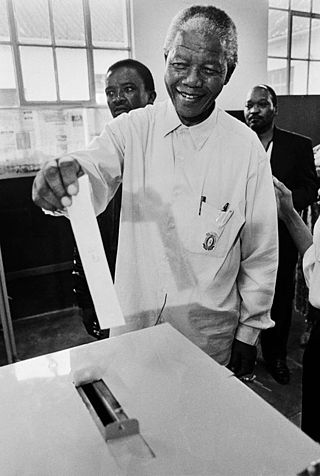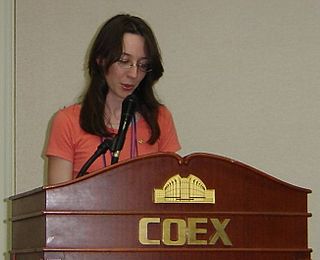
Democracy is a system of government and form of liberalism in which state power is vested in the people, or the general population of a state based on principles of liberty and free will. According to the United Nations, democracy "provides an environment that respects human rights and fundamental freedoms, and in which the freely expressed will of people is exercised."
Participatory democracy, participant democracy or participative democracy is a form of government in which citizens participate individually and directly in political decisions and policies that affect their lives, rather than through elected representatives. Elements of direct and representative democracy are combined in this model.

The propaganda model is a conceptual model in political economy advanced by Edward S. Herman and Noam Chomsky to explain how propaganda and systemic biases function in corporate mass media. The model seeks to explain how populations are manipulated and how consent for economic, social, and political policies, both foreign and domestic, is "manufactured" in the public mind due to this propaganda. The theory posits that the way in which corporate media is structured creates an inherent conflict of interest and therefore acts as propaganda for anti-democratic elements.

Citizen journalism, also known as collaborative media, participatory journalism, democratic journalism, guerrilla journalism or street journalism, is based upon public citizens "playing an active role in the process of collecting, reporting, analyzing, and disseminating news and information." Similarly, Courtney C. Radsch defines citizen journalism "as an alternative and activist form of news gathering and reporting that functions outside mainstream media institutions, often as a response to shortcomings in the professional journalistic field, that uses similar journalistic practices but is driven by different objectives and ideals and relies on alternative sources of legitimacy than traditional or mainstream journalism". Jay Rosen offers a simpler definition: "When the people formerly known as the audience employ the press tools they have in their possession to inform one another." The underlying principle of citizen journalism is that ordinary people, not professional journalists, can be the main creators and distributors of news. Citizen journalism should not be confused with community journalism or civic journalism, both of which are practiced by professional journalists; collaborative journalism, which is the practice of professional and non-professional journalists working together; and social journalism, which denotes a digital publication with a hybrid of professional and non-professional journalism.

E-democracy, also known as digital democracy or Internet democracy, uses information and communication technology (ICT) in political and governance processes. The term is credited to digital activist Steven Clift. By using 21st-century ICT, e-democracy seeks to enhance democracy, including aspects like civic technology and E-government. Proponents argue that by promoting transparency in decision-making processes, e-democracy can empower all citizens to observe and understand the proceedings. Also, if they possess overlooked data, perspectives, or opinions, they can contribute meaningfully. This contribution extends beyond mere informal disconnected debate; it facilitates citizen engagement in the proposal, development, and actual creation of a country's laws. In this way, e-democracy has the potential to incorporate crowdsourced analysis more directly into the policy-making process.
Alternative media are media sources that differ from established or dominant types of media in terms of their content, production, or distribution. Sometimes the term independent media is used as a synonym, indicating independence from large media corporations, but this term is also used to indicate media enjoying freedom of the press and independence from government control. Alternative media does not refer to a specific format and may be inclusive of print, audio, film/video, online/digital and street art, among others. Some examples include the counter-culture zines of the 1960s, ethnic and indigenous media such as the First People's television network in Canada, and more recently online open publishing journalism sites such as Indymedia.
Media democracy is a democratic approach to media studies that advocates for the reform of mass media to strengthen public service broadcasting and develop participation in alternative media and citizen journalism in order to create a mass media system that informs and empowers all members of society and enhances democratic values.

Civic engagement or civic participation is any individual or group activity addressing issues of public concern. Civic engagement includes communities working together or individuals working alone in both political and non-political actions to protect public values or make a change in a community. The goal of civic engagement is to address public concerns and promote the quality of the community.

Citizen media is content produced by private citizens who are not professional journalists. Citizen journalism, participatory media and democratic media are related principles.
Civic journalism is the idea of integrating journalism into the democratic process. The media not only informs the public, but it also works towards engaging citizens and creating public debate. The civic journalism movement is an attempt to abandon the notion that journalists and their audiences are spectators in political and social processes. In its place, the civic journalism movement seeks to treat readers and community members as participants.
Participatory media is communication media where the audience can play an active role in the process of collecting, reporting, analyzing and disseminating content. Citizen / participatory journalism, citizen media, empowerment journalism and democratic media are related principles.

Civic intelligence is an "intelligence" that is devoted to addressing public or civic issues. The term has been applied to individuals and, more commonly, to collective bodies, like organizations, institutions, or societies. Civic intelligence can be used in politics by groups of people who are trying to achieve a common goal. Social movements and political engagement in history might have been partly involved with collective thinking and civic intelligence. Education, in its multiple forms, has helped some countries to increase political awareness and engagement by amplifying the civic intelligence of collaborative groups. Increasingly, artificial intelligence and social media, modern innovations of society, are being used by many political entities and societies to tackle problems in politics, the economy, and society at large.

Political journalism is a broad branch of journalism that includes coverage of all aspects of politics and political science, although the term usually refers specifically to coverage of civil governments and political power.
Community journalism is locally-oriented, professional news coverage that typically focuses on city neighborhoods, individual suburbs or small towns, rather than metropolitan, state, national or world news.
Mediated deliberation is a form of deliberation that is achieved through the media which acts as a mediator between the mass public and elected officials. The communication professionals of the media relay information, values, and diverse points of view to the public in order for effective public deliberation to occur. Benjamin Page proposes mediated deliberation be a "division of labor" with the idea of using the media to deliver information between the elected officials and the public because modern problems make it impossible to rely on the elected officials to deliberate for the public. The role of the media is to encourage discussion amongst the citizens to keep them engaged with their elected officials.

Liquid democracy is a form of delegative democracy, whereby an electorate engages in collective decision-making through direct participation and dynamic representation. This democratic system utilizes elements of both direct and representative democracy. Voters in a liquid democracy have the right to vote directly on all policy issues à la direct democracy; voters also have the option to delegate their votes to someone who will vote on their behalf à la representative democracy. Any individual may be delegated votes and these proxies may in turn delegate their vote as well as any votes they have been delegated by others resulting in "metadelegation".
Media reform refers to proposed attempts to reform mass media towards an agenda which is more in tune with public needs and away from a perceived bias toward corporate, government or political biases. Media reform advocates also place a strong emphasis upon enabling those who are marginalized or semi-marginalized by their individual incomes, immutable characteristics or desperate conditions to possess access to means of publication and dissemination of information. They do not come from a concern with policy, or with a desire to democratize federal bureaucracies and regulations.

Radical media are communication outlets that disperse action-oriented political agendas utilizing existing communication infrastructures and its supportive users. These types of media are differentiated from conventional mass communications through its progressive content, reformist culture, and democratic process of production and distribution. Advocates support its alternative and oppositional view of mass media, arguing that conventional outlets are politically biased through their production and distribution. However, there are some critics that exist in terms of validating the authenticity of the content, its political ideology, long-term perishability, and the social actions led by the media.
The Institute for Democratic Alternatives in South Africa (IDASA) later known as the Institute for Democracy in South Africa was a South African-based think-tank organisation that was formed in 1986 by Frederik van Zyl Slabbert and Alex Boraine. Its initial focus from 1987 was creating an environment for white South Africans to talk to the banned liberation movement in-exile, the African National Congress (ANC) prior to its unbanning in 1990 by the President F. W. de Klerk. After the South African election in 1994, its focus was on ensuing the establishment of democratic institutions in the country, political transparency and good governance. Caught up in a funding crisis after the 2008 global financial crisis, closed in 2013.
Oral democracy is a talk-based form of government and political system in which citizens of a determined community have the opportunity to deliberate, through direct oral engagement and mass participation, in the civic and political matters of their community. Additionally, oral democracy represents a form of direct democracy, which has the purpose of empowering citizens by creating open spaces that promote an organized process of discussion, debate, and dialogue that aims to reach consensus and to impact policy decision-making. Political institutions based on this idea of direct democracy seek to decrease the possibilities of state capture from elites by holding them accountable, to encourage civic participation and collective action, and to improve the efficiency and adaptability of development interventions and public policy implementation.









